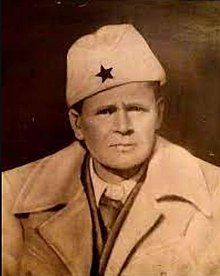Nurija Pozderac was a Muslim Yugoslavian resistance leader who fought Nazis in the streets and provided shelter to Jewish refugees in his own home.

Nurija was born in 1892 in Cazin, a mountain town in NW Bosnia, near the Croatian border. Cazin is currently in Bosnia-Herzegovina, but was previously part of the Ottoman Empire. Nurija was one of eleven children of Murat Pozderac, leader of Cazin during the last days of the Ottomans. The family were devout Muslims and Murat had three wives, which was common in 19th century Bosnia.
Nurija began his career as a schoolteacher but, like his father, was interested in politics and joined the Yugoslav Muslim Organization. His intellect, charisma and leadership skills made him a popular and influential figure in the Muslim community as well as the larger city. Support for Nurija in the city of Cazin spanned religious and political lines.
In April 1941 the Germans led a brutal invasion of Yugoslavia. Axis forces occupied and partitioned a wide area and created a fascist state of Croatia. The new independent state was controlled by the fascist movement Utasha. Immediately upon taking power the Nazi-allied Croatian Utasha began a systemic reign of terror to “racially purify” Croatia. Ustase stormtroopers began deporting and massacring entire populations of “undesirables” including Jews, Serbs, and Romas. Much of the slaughter occurred at the notorious Jasenovac concentration camp.
Dzafer Kulenovic served as Vice President of the fascist Independent State of Croatia. He had noticed the young Muslim politician Nurija Pozderac and was impressed enough to offer Nurija a ministry position in the new government. But Nurija was outraged by the Utasha’s fascist violence and wanted no part of it. Nurjia instead joined the Yugoslav Partisans, an armed anti-fascist resistance movement. He gave a fiery speech at the central meeting place in Cazin, inspiring thousands of others to join the resistance movement. The partisans carried out sabotage and armed acts of resistance against the occupying Axis forces.
During this time, a steady stream of refugees poured into Cazin, many of them Jews desperately afraid of being deported to a camp. Nurija and his wife Devleta welcomed the refugees into their own home, sheltering thousands of individuals and families, most of them Jewish, during the four years of fascist rule. They provided them with food, safe shelter, and all their basic needs.
Nurija rose to prominence in the Yugoslav freedom movement and was elected vice-president of the Executive Board. The Yugoslav Partisans, also known as the National Liberation Army, started out in 1941 as a scrappy but highly effective armed guerrilla insurgence. By spring of 1943 they numbered tens of thousands, and the Axis forces mounted a fierce attack on their High Command in Sutjeska. In the battle of Sutjeska, Nurija sustained a mortal wound. He died four days later in his son Sead’s arms.
Nurija was gone, but the fascists continued to torment the Pozderac family. His beloved wife Devleta was captured by Utashas and taken to a Croatian concentration camp. New Yugoslav leader Josip Tito negotiated for her freedom and exchanged a captured German officer for her.
Among the people saved by the Pozderacs were Jewish Yugoslavians Moni Atjas, Izidor Levi, and Klarica Levi. Decades after the war, each of them submitted a testimonial about the Pozderacs’ heroic actions to Israeli Holocaust Memorial Yad Vashem. In 2013, Nurija and his wife Devleta were honored posthumously as Righteous Among the Nations. Their daughter Sadeta Buljubasic received the award on their behalf.
For making the ultimate sacrifice to save lives and free his country, we honor Nurija Pozderac as this week’s Thursday Hero.
Get the best of Accidental Talmudist in your inbox: sign up for our weekly newsletter.